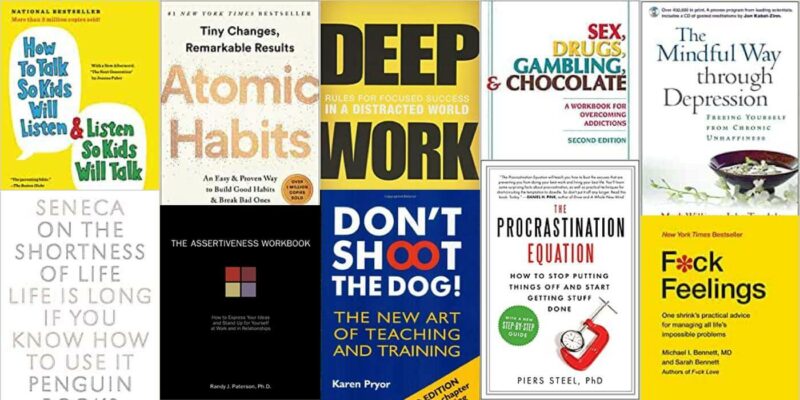As a therapist, I hear a lot of stories about very unhappy couples:
- We fight constantly…
- I haven’t felt close to him in years…
- She’s so negative all the time…
- At the best of times it feels like we’re roommates…
- I just dread having to spend time with her…
- He’s just totally checked out and uninterested…
To paraphrase the great Russian novelist Tolstoy:
All happy couples are alike, but every unhappy couple is unhappy in its own way.
So what is it that consistently happy couples do differently than unhappy ones? Well, I’m not sure it’s what they do that’s different…
Happiness as a couple might be less about what you should do and more about what you should avoid doing.
A striking pattern I’ve observed is that many of the most unhappy couples I’ve seen fall into a handful of bad habits that seem to sabotage their relationship in a deep way.
On the other hand, generally happy couples seem to avoid falling into these patterns in the first place.
1. Playing Doctor with Your Partner’s Problems
It natural to want to help when someone we love is feeling bad:
- When our spouse is stressed because of work, we want them to feel calmer.
- When our partner is still angry about yesterday’s fight, we want them to let it go.
- When our husband is down and depressed, we want him to cheer up and get back to his normal self again.
But the crucial question is this…
Do you really want them to feel better or are you really more concerned with yourself feeling better?
Because as much as we don’t want our partners to feel bad, the uncomfortable truth is, usually when our partner feels bad so do we!
Here’s an example from my own life:
- When my wife feels stressed, it makes me uncomfortable because things don’t feel as smooth and fun as they normally do between us.
- So when I try and help her be less stressed, often the real motivation is my own feelings… Specifically, I don’t want to feel stressed as a result of her feeling stressed.
- This means that it’s very easy for me to fall into the trap of trying to “fix” her painful feelings by giving advice or telling her what I think she should do to feel better.
Here’s the problem with playing doctor with your partner’s feelings:
When you try to fix your partner’s feelings, you invalidate those feelings and make them feel bad about feeling bad.
Often the best thing we can do when our partner is feeling bad is to accept it, which means accepting that they feel bad and that we will feel bad to some extent too.
But to be genuinely accepting, you have to remind yourself that just because something feels bad doesn’t mean it is bad.
It’s hard feeling helpless. But sometimes we are helpless.
People feel bad. And when our partner feels bad, it’s almost inevitable that we will feel a little bad too. The best we can do is not make things worse by forcing them to get better.
Resist the urge to give advice and play doctor, and instead, try your best to just listen compassionately and be patient.
“Never miss a good chance to shut up.”
― Will Rogers
2. Weaponizing Ancient History
We all get into arguments and fights with our partners. But how those arguments and fights happen makes all the difference to the health and happiness in a relationship.
One of the most toxic habits I see couples fall into in their arguments is weaponizing ancient history…
Weaponizing ancient history means bringing up your partner’s mistakes or transgressions from the past in order to win an argument in the present.
The main problem here is that it kills trust in the relationship.
Specifically, it kills that essential form of trust that any happy relationship needs: The ability to trust that we can move beyond our mistakes and not be held prisoner to them.
But they did do that thing… If they didn’t want to be reminded of it they shouldn’t have done it in the first place!
Dreading up ancient history may be accurate and true, but it’s almost never helpful.
In reality, when you insist on revisiting ancient history in your relationship, it’s usually just a cheap defense mechanism for boosting your own ego and feeling better about yourself or avoiding doing really hard work in the relationship.
If you really care about the long-term health and happiness of your relationship, resist the urge to “win” an argument in the present by weaponizing ancient history.
“Yesterday is gone. Tomorrow has not yet come. We have only today. Let us begin.”
― Mother Theresa
3. Keeping Score
It’s easy to get competitive in your relationship. But once you do, you’ve already lost.
By and large, happy couples feel like partners and teammates who struggle together through the challenges of life (and celebrate all the good stuff along the way:)
But it’s surprisingly easy for couples to move from working together to working against each other:
- Trying to win arguments instead of really listening to the other person’s side
- Refusing to compromise when you can and stonewalling your partner until they give in
- And like we discussed in the point above, using ancient history as a weapon against them to score points come out on top
Keeping score in a relationship means mentally tracking how many wrongs the other person has committed so you can keep yourself in a position of moral authority.
When one or both partners get in the habit of keeping score in the relationship it’s usually a sign of insecurity. Because you feel bad (guilty, ashamed, afraid, etc) you temporarily make yourself feel better by reminding the other person of their mistakes and presenting your (apparent) superiority.
This feels good in the moment—it’s an ego boost. But in the long term, it’s usually both untrue and unhelpful to your happiness as a couple.
Instead of obsessively keeping score about how many times your partner has slipped up or wronged you, try giving them some grace. This doesn’t mean you should be a pushover, of course. It’s important to be assertive and maintain healthy boundaries (see #5 below).
But healthy relationships need a little buffer. We all make mistakes. But if every time we make a mistake, we’re reminded of it and how we’re “losing” to the other person, it’s hard for genuine trust and caring to grow.
If you feel the need to keep score in your relationship, ask yourself why you feel that need in the first place and if there isn’t a better way to get that need met in a healthier way.
“Genuine self esteem is not competitive or comparative.”
― Nathaniel Branden
4. Gossiping About the Relationship
One of the biggest complaints I hear from people about their partners is that they gossip about them and the relationship with other people.
A few quick examples:
- My wife just won’t stop talking to her girlfriends about all our problems…
- He tells his mother everything, which is just so weird, right?
- I know she’s her sister, but does she really need to know about how we’re having trouble in our sex life?
Now, everyone has a different threshold for what they think is acceptable information about their spouse or the relationship to share.
For example:
- Almost everyone can agree that there’s probably nothing wrong with talking casually about what you had for dinner last night to your coworker.
- But would you be okay with your partner talking to their best friend about that fight you had recently over your fears and inadequacies?
Of course, reasonable people can disagree personally on these things. But here’s the deal:
It becomes problematic if you and your partner disagree about what’s okay to share and with whom.
Gossiping about your relationship means talking to other people about aspects of your relationship or your partner in a way that your partner is not okay with.
This is problematic for a couple reasons:
- It destroys trust, creates resentment, and kills intimacy. If I can’t trust that my partner will not talk about certain things, pretty soon I’m going to stop sharing things with my partner. Eventually, I’ll begin to resent this and that resentment will lead to major intimacy problems.
- It’s a form of procrastination on the hard work of maintaining a healthy relationship. When you gossip about your partner or relationship issues, it feels like you’re doing something productive. But 9 times out of 10, that feeling is an illusion. And really it’s just a way to avoid doing the hard work of actually addressing the issues in your relationship.
If you want a happy, healthy relationship, you and your partner need to be very clear about what’s okay to share outside the relationship and what’s not. And if you fundamentally disagree here, it’s hard to see how that relationship can flourish long-term.
In general, it’s my observation that couples tend to do better when they keep sensitive relationship issues within the relationship. If you need to, hire a professional therapist or counselor who can maintain confidentiality.
But be very careful about gossiping outside the relationship.
Venting your relationship frustrations to others can feel cathartic in the moment. But the long-term effects on the health of the relationship are frequently toxic.
“We reveal most about ourselves when we speak about others.”
― Kamand Kojouri
5. Going with the Flow
Resentment may be the #1 relationship killer out there.
But identifying what causes resentment in the first place can be difficult.
In my experience, a common cause of resentment between couples that most people miss is going with the flow.
Going with the flow…?
I know it sounds a little strange but hear me out…
In some ways, the ability to just go with it sounds like a good thing, right?
- You imagine someone who’s laid-back and easy-going…
- Or someone who’s good at compromise—something we’re told is essential for a healthy relationship.
While the ability to go with the flow can be nice, it can just as easily be a toxic habit that builds resentment and erodes happy relationships.
And the reason is actually pretty simple:
The habit of going with the flow is often a sign of poor boundaries and low assertiveness.
For example:
- Your spouse asks what you want for dinner. You say How about Chinese? They respond with You know I don’t like Chinese… What about Italian? To which you reply back Oh, sure. That sounds good not because it actually sounds good but because you’re trying to keep the peace and go with the flow.
Here’s another higher-stakes example I heard from a client recently:
- My client’s husband told her he wanted to explore having an “open marriage.” And even though my client felt profoundly uncomfortable with the idea, she was so afraid of disappointing him and coming across as insecure, that she immediately said okay. Needless to say, this led to some pretty significant resentments and conflict in their relationship.
Going with the flow might seem noble or less stressful in the moment, but it’s almost always a setup for future resentment and conflict in the long run.
If you suspect your habit of going with the flow is leading to problems, you probably need to learn to communicate more assertively and get better at setting healthy boundaries.
“You wear a mask for so long, you forget who you were beneath it.”
― Alan Moore
All You Need to Know
If you want to improve the quality of your relationship, look out for these 5 habits and work to eliminate them as much as possible:
- Playing Doctor with Your Partner’s Problems
- Weaponizing Ancient History
- Keeping Score
- Gossiping About the Relationship
- Going with the Flow





5 Comments
Add YoursSpot on advice and guidance! As you likely have seen, the timing of discovering this piece also happens to come at an important time for my wife and me… 26 years and getting better! Looking forward to more nuggets.
How does “keeping score” or ancient history line up against “things apologized for and resolved” that never actually resolve. A week or two later the same behavior continues.
Can these elements ever be referred to later as “a pattern of verbally discussed/unresolved issues” or is it best to only mention the latest episode?
Nice article – I do think going with the flow on things that are a non-issue for us, on issues that we are neutral about – is a good thing. In fact, the more the number of things that are a non-issue the more truly easy-going we are.
This is really amazing
God bless you graciously
This is so valuable. What I’ve learned is that when I was going with the flow,it was because I had no clear picture and I didn’t know what I wanted. So realize that after many years of going with the flow I became resentful, but really it came down to me not taking responsibility and not knowing what I wanted …because when you are clear about what you want you can choose and “set” boundaries but unless you know your own desires this won’t be possible.